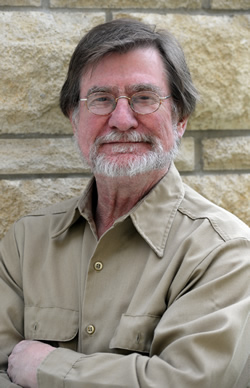|
The trick of the fiction writer is the beautiful lie, writing words to create experiences that never happened. When the novel was still "novel," writers often imitated nonfiction forms—diaries (Wuthering Heights), letters (Pamela), travelogues (Robinson Crusoe). Writers are still up to the same trick, so much that Lucy Ives coined a term for it in a 2016 blog in The New Yorker. She calls it "archival fiction."
My new novel, Found Documents from the Life of Nell Johnson Doerr (University of New Mexico Press, February 2018), fits that term. A collection of letters, diary entries, notes, and drawings, all purported to have been found in an archive, the novel is all false documents. Set in Lawrence, Kansas, between 1854-1890, Found tells the story of Nell Doerr, who, after losing her husband in Quantrill's Raid in 1863, and after discovering, while hiding in her basement, the forms of ancient creatures in the foundation rock, becomes fascinated with fossils. In her study of bryozoans, she becomes an amateur invertebrate paleontologist, eventually writing a paper presented in Washington, D.C. As it happens, Nell is a character from my novel rode, a baby rescued from the embers of her dead parents' cabin in 1825 on the Hatchie River of Tennessee, and adopted by Robert and Jo Johnson. She and her husband move to Lawrence to be part of the Underground Railroad.
An imagined archive is as demanding as a real archive. Given my subject, I researched the political history of the U.S. and Kansas. I learned the names of Lawrence merchants, the history of railroad and dam building, the Unitarian church, the fledgling days of Kansas University. Since Nell was an amateur paleontologist, I learned about fossils, as well as the history of science—when people knew what about rock formations and fossil deposits in and around Lawrence. After the "fact finding," I could take the advice I give other writers: "Know it cold, then write it hot." Still, I had to find voices and vocabulary true to character, time and place.
Writing is a form of discovery. It is also, as writer Ben Lerner has said, a form of very close reading. Words put voice and flesh onto the page, one at a time, and the writer must pay close attention to what the words are saying, sensually and emotionally. As a writer I want to be controlled by words, guided, led, by language. In Writing the Australian Crawl, William Stafford likens writing to swimming, trusting language, like water, to hold you up. If writing is close reading, writing archival fiction is like transcription. I often felt like I was transcribing, rather than creating, what Nell and the other characters wrote. I "read" their words as I was writing them. I felt lucky through the process. Here is Nell's voice in an 1855 letter to her sister: Mary, I have left Arkansas, and family, and the two babes earthed in our family plot. I have given up my garden, my precious roses nodding with dew in dawn light. I have given up trees, and make do with grass. I have given up streams and creeks for ditches and draws. I have given up shade for punishing sun and gentle rain for cloudbursts.
Finally, as with any set of documents, the researcher/writer must find in them the metaphors that create meaning. Nell Doerr was, after all, rescued, discovered, found, and she is also a rescuer (Underground Railroad), a discoverer (of fossils), and a finder (of science and of herself). At the end of the novel, her sister sends her a stone. Nell writes:
The stone is a geode. That it was gathered from the place of my birth and near death is shock to me. How much else was kept from me? …
I broke the rock, one clean hit of hammer on chisel. Each half was a cave of purple crystals, amethyst, like sharp teeth, jagged, mirroring light, color softening at the points, a beauty hidden all these years. My father knew what was inside. He wanted to break the rock. But he did not. So much of what we know is on the surface only. Many think we are not meant to delve deeply. We are afraid to break the rock. Who knows what we might find inside? I have broken the rock and found beauty. Over and over I have broken the rock.
As I sought and discovered, and, yes, "found" the world of Nell, I was creating a beautiful lie that told the truth, just as I imagined she herself was doing in her diary. Such was my pleasure in writing archival fiction.
|


